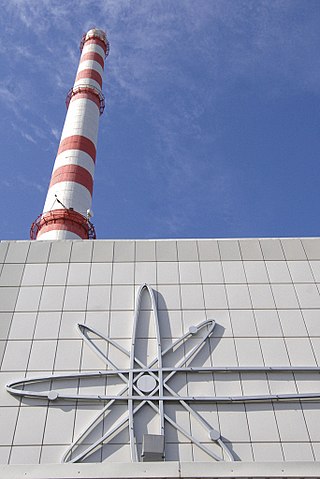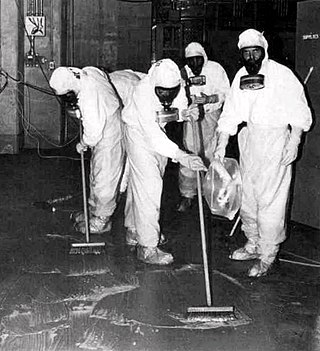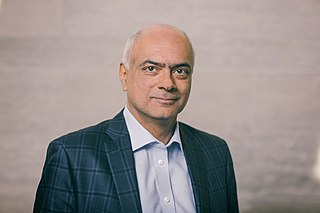
The International Atomic Energy Agency (IAEA) is an intergovernmental organization that seeks to promote the peaceful use of nuclear energy and to inhibit its use for any military purpose, including nuclear weapons. It was established in 1957 as an autonomous organization within the United Nations system; though governed by its own founding treaty, the organization reports to both the General Assembly and the Security Council of the United Nations, and is headquartered at the UN Office at Vienna, Austria.

The Centre for International Governance Innovation is an independent, non-partisan think tank on global governance. CIGI supports research, forms networks, advances policy debate and generates ideas for multilateral governance improvements. CIGI's interdisciplinary work includes collaboration with policy, business and academic communities around the world.

Energy policy is the manner in which a given entity has decided to address issues of energy development including energy conversion, distribution and use as well as reduction of greenhouse gas emissions in order to contribute to climate change mitigation. The attributes of energy policy may include legislation, international treaties, incentives to investment, guidelines for energy conservation, taxation and other public policy techniques. Energy is a core component of modern economies. A functioning economy requires not only labor and capital but also energy, for manufacturing processes, transportation, communication, agriculture, and more. Energy planning is more detailed than energy policy.

Rosatom, also known as Rosatom State Nuclear Energy Corporation, the State Atomic Energy Corporation Rosatom, or Rosatom State Corporation, is a Russian state corporation headquartered in Moscow that specializes in nuclear energy, nuclear non-energy goods and high-tech products. Established in 2007, the nonprofit organization comprises more than 350 enterprises, including scientific research organizations, a nuclear weapons complex, and the world's only nuclear icebreaker fleet.

Louise Fréchette, OC is a Canadian diplomat and public servant who served for eight years as United Nations Deputy Secretary-General. She also served a three-year term at the Centre for International Governance Innovation, an international relations and policy think-tank in Waterloo, Ontario, working on a major research project on nuclear energy and the world's security.

Nuclear energy policy is a national and international policy concerning some or all aspects of nuclear energy and the nuclear fuel cycle, such as uranium mining, ore concentration, conversion, enrichment for nuclear fuel, generating electricity by nuclear power, storing and reprocessing spent nuclear fuel, and disposal of radioactive waste. Nuclear energy policies often include the regulation of energy use and standards relating to the nuclear fuel cycle. Other measures include efficiency standards, safety regulations, emission standards, fiscal policies, and legislation on energy trading, transport of nuclear waste and contaminated materials, and their storage. Governments might subsidize nuclear energy and arrange international treaties and trade agreements about the import and export of nuclear technology, electricity, nuclear waste, and uranium.

The Joint Research Centre (JRC) is the European Commission's science and knowledge service which employs scientists to carry out research in order to provide independent scientific advice and support to European Union (EU) policy.

Russia is one of the world's largest producers of nuclear energy. In 2020 total electricity generated in nuclear power plants in Russia was 215.746 TWh, 20.28% of all power generation. The installed gross capacity of Russian nuclear reactors is 29.4 GW in December 2020.

Nuclear safety is defined by the International Atomic Energy Agency (IAEA) as "The achievement of proper operating conditions, prevention of accidents or mitigation of accident consequences, resulting in protection of workers, the public and the environment from undue radiation hazards". The IAEA defines nuclear security as "The prevention and detection of and response to, theft, sabotage, unauthorized access, illegal transfer or other malicious acts involving nuclear materials, other radioactive substances or their associated facilities".

Marcoule Nuclear Site is a nuclear facility in the Chusclan and Codolet communes, near Bagnols-sur-Cèze in the Gard department of France, which is in the tourist, wine and agricultural Côtes-du-Rhône region. The plant is around 25 km north west of Avignon, on the banks of the Rhone.
Greenpeace Nordic is a regional branch of the non-governmental international environmental organization Greenpeace. Greenpeace Nordic is registered in Stockholm with offices also in Helsinki, Copenhagen and Oslo.

World Nuclear Association is the international organization that promotes nuclear power and supports the companies that comprise the global nuclear industry. Its members come from all parts of the nuclear fuel cycle, including uranium mining, uranium conversion, uranium enrichment, nuclear fuel fabrication, plant manufacture, transport, and the disposal of used nuclear fuel as well as electricity generation itself.
As of 2022, nuclear power is provided by six commercial nuclear power plants in Pakistan. Pakistan is the first Muslim majority country in the world to construct and operate civil nuclear power plants. The Pakistan Atomic Energy Commission (PAEC), the scientific and nuclear governmental agency, is solely responsible for operating these power plants. As of 2018, the electricity generated by commercial nuclear power plants constitutes roughly 7.5% of electricity generated in Pakistan, Pakistan is not a party to the Nuclear Non-Proliferation Treaty but is a member of the International Atomic Energy Agency. Pakistan plans on constructing 32 nuclear power plants by 2050 and envisions 40,000 MW of nuclear power generation.

The energy policy of the European Union focuses on energy security, sustainability, and integrating the energy markets of member states. An increasingly important part of it is climate policy. A key energy policy adopted in 2009 is the 20/20/20 objectives, binding for all EU Member States. The target involved increasing the share of renewable energy in its final energy use to 20%, reduce greenhouse gases by 20% and increase energy efficiency by 20%. After this target was met, new targets for 2030 were set at a 55% reduction of greenhouse gas emissions by 2030 as part of the European Green Deal. After the Russian invasion of Ukraine, the EU's energy policy turned more towards energy security in their REPowerEU policy package, which boosts both renewable deployment and fossil fuel infrastructure for alternative suppliers.

China is one of the world's largest producers of nuclear power. The country ranks third in the world both in total nuclear power capacity installed and electricity generated, accounting for around one tenth of global nuclear power generated. As of February 2023, China has 55 plants with 57GW in operation, 22 under construction with 24 GW and more than 70 planned with 88GW. About 5% of electricity in the country is due to nuclear energy. These plants generated 417 TWh of electricity in 2022 This is versus the September 2022 numbers of 53 nuclear reactors, with a total capacity of 55.6 gigawatt (GW). In 2019, nuclear power had contributed 4.9% of the total Chinese electricity production, with 348.1 TWh.

Since about 2001 the term nuclear renaissance has been used to refer to a possible nuclear power industry revival, driven by rising fossil fuel prices and new concerns about meeting greenhouse gas emission limits.

The Balsillie School of International Affairs (BSIA) is a centre for advanced research and teaching on global governance and international public policy, located in Waterloo, Ontario. As one of the largest social sciences initiatives in Canada, the school is a collaborative partnership between the University of Waterloo, Wilfrid Laurier University, and the Centre for International Governance Innovation. The BSIA is an affiliate member of the Association of Professional Schools of International Affairs, a group of schools that educate leaders in international affairs. The BSIA is housed in the north and west wings of the CIGI Campus. Admission to BSIA is highly selective.
Kristin Shrader-Frechette is O'Neill Family Professor, Department of Biological Sciences and Department of Philosophy, at the University of Notre Dame. She has previously held senior professorships at the University of California and the University of Florida. Most of Shrader-Frechette's research work analyzes the ethical problems in risk assessment, public health, or environmental justice - especially those related to radiological, ecological, and energy-related risks. Shrader-Frechette has received the Global Citizenship Award, and the Catholic Digest named her one of 12 "Heroes for the US and the World".

Long one of the world's most committed promoters of civilian nuclear power, Japan's nuclear industry was not hit as hard by the effects of the 1979 Three Mile Island accident (USA) or the 1986 Chernobyl disaster (USSR) as some other countries. Construction of new plants continued to be strong through the 1980s and into the 1990s. However, starting in the mid-1990s there were several nuclear related accidents and cover-ups in Japan that eroded public perception of the industry, resulting in protests and resistance to new plants. These accidents included the Tokaimura nuclear accident, the Mihama steam explosion, cover-ups after accidents at the Monju reactor, and the 21 month shut down of the Kashiwazaki-Kariwa Nuclear Power Plant following an earthquake in 2007. Because of these events, Japan's nuclear industry has been scrutinized by the general public of the country.

Rohinton P. Medhora is a Canadian economist. His fields of expertise are monetary and trade policy, international economic relations, and development economics. He is a Centre for International Governance Innovation (CIGI) distinguished fellow, former president of CIGI and professor of practice at McGill University's Institute for the Study of International Development.
















